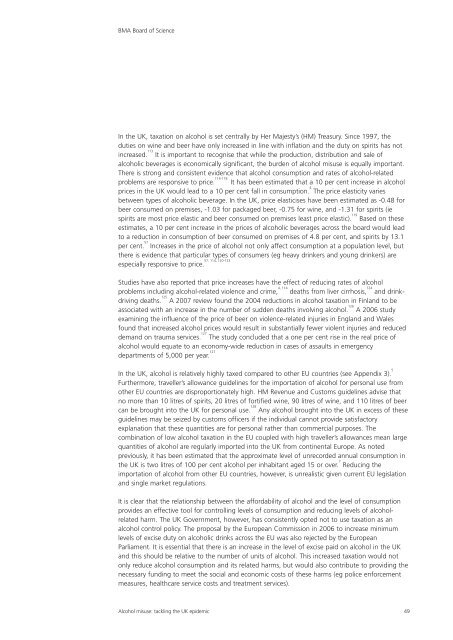Alcohol misuse: tackling the UK epidemic - London
Alcohol misuse: tackling the UK epidemic - London
Alcohol misuse: tackling the UK epidemic - London
You also want an ePaper? Increase the reach of your titles
YUMPU automatically turns print PDFs into web optimized ePapers that Google loves.
BMA Board of Science<br />
In <strong>the</strong> <strong>UK</strong>, taxation on alcohol is set centrally by Her Majesty’s (HM) Treasury. Since 1997, <strong>the</strong><br />
duties on wine and beer have only increased in line with inflation and <strong>the</strong> duty on spirits has not<br />
increased. 113<br />
It is important to recognise that while <strong>the</strong> production, distribution and sale of<br />
alcoholic beverages is economically significant, <strong>the</strong> burden of alcohol <strong>misuse</strong> is equally important.<br />
There is strong and consistent evidence that alcohol consumption and rates of alcohol-related<br />
problems are responsive to price. 114-118<br />
It has been estimated that a 10 per cent increase in alcohol<br />
prices in <strong>the</strong> <strong>UK</strong> would lead to a 10 per cent fall in consumption. 4<br />
The price elasticity varies<br />
between types of alcoholic beverage. In <strong>the</strong> <strong>UK</strong>, price elasticises have been estimated as -0.48 for<br />
beer consumed on premises, -1.03 for packaged beer, -0.75 for wine, and -1.31 for spirits (ie<br />
spirits are most price elastic and beer consumed on premises least price elastic). 119<br />
Based on <strong>the</strong>se<br />
estimates, a 10 per cent increase in <strong>the</strong> prices of alcoholic beverages across <strong>the</strong> board would lead<br />
to a reduction in consumption of beer consumed on premises of 4.8 per cent, and spirits by 13.1<br />
per cent. 57<br />
Increases in <strong>the</strong> price of alcohol not only affect consumption at a population level, but<br />
<strong>the</strong>re is evidence that particular types of consumers (eg heavy drinkers and young drinkers) are<br />
57, 114, 120-123<br />
especially responsive to price.<br />
Studies have also reported that price increases have <strong>the</strong> effect of reducing rates of alcohol<br />
4, 114<br />
problems including alcohol-related violence and crime, deaths from liver cirrhosis, 124<br />
and drinkdriving<br />
deaths. 125<br />
A 2007 review found <strong>the</strong> 2004 reductions in alcohol taxation in Finland to be<br />
associated with an increase in <strong>the</strong> number of sudden deaths involving alcohol. 126<br />
A 2006 study<br />
examining <strong>the</strong> influence of <strong>the</strong> price of beer on violence-related injuries in England and Wales<br />
found that increased alcohol prices would result in substantially fewer violent injuries and reduced<br />
demand on trauma services. 127<br />
The study concluded that a one per cent rise in <strong>the</strong> real price of<br />
alcohol would equate to an economy-wide reduction in cases of assaults in emergency<br />
departments of 5,000 per year. 127<br />
In <strong>the</strong> <strong>UK</strong>, alcohol is relatively highly taxed compared to o<strong>the</strong>r EU countries (see Appendix 3). 5<br />
Fur<strong>the</strong>rmore, traveller’s allowance guidelines for <strong>the</strong> importation of alcohol for personal use from<br />
o<strong>the</strong>r EU countries are disproportionately high. HM Revenue and Customs guidelines advise that<br />
no more than 10 litres of spirits, 20 litres of fortified wine, 90 litres of wine, and 110 litres of beer<br />
can be brought into <strong>the</strong> <strong>UK</strong> for personal use. 128<br />
Any alcohol brought into <strong>the</strong> <strong>UK</strong> in excess of <strong>the</strong>se<br />
guidelines may be seized by customs officers if <strong>the</strong> individual cannot provide satisfactory<br />
explanation that <strong>the</strong>se quantities are for personal ra<strong>the</strong>r than commercial purposes. The<br />
combination of low alcohol taxation in <strong>the</strong> EU coupled with high traveller’s allowances mean large<br />
quantities of alcohol are regularly imported into <strong>the</strong> <strong>UK</strong> from continental Europe. As noted<br />
previously, it has been estimated that <strong>the</strong> approximate level of unrecorded annual consumption in<br />
<strong>the</strong> <strong>UK</strong> is two litres of 100 per cent alcohol per inhabitant aged 15 or over. 7<br />
Reducing <strong>the</strong><br />
importation of alcohol from o<strong>the</strong>r EU countries, however, is unrealistic given current EU legislation<br />
and single market regulations.<br />
It is clear that <strong>the</strong> relationship between <strong>the</strong> affordability of alcohol and <strong>the</strong> level of consumption<br />
provides an effective tool for controlling levels of consumption and reducing levels of alcoholrelated<br />
harm. The <strong>UK</strong> Government, however, has consistently opted not to use taxation as an<br />
alcohol control policy. The proposal by <strong>the</strong> European Commission in 2006 to increase minimum<br />
levels of excise duty on alcoholic drinks across <strong>the</strong> EU was also rejected by <strong>the</strong> European<br />
Parliament. It is essential that <strong>the</strong>re is an increase in <strong>the</strong> level of excise paid on alcohol in <strong>the</strong> <strong>UK</strong><br />
and this should be relative to <strong>the</strong> number of units of alcohol. This increased taxation would not<br />
only reduce alcohol consumption and its related harms, but would also contribute to providing <strong>the</strong><br />
necessary funding to meet <strong>the</strong> social and economic costs of <strong>the</strong>se harms (eg police enforcement<br />
measures, healthcare service costs and treatment services).<br />
<strong>Alcohol</strong> <strong>misuse</strong>: <strong>tackling</strong> <strong>the</strong> <strong>UK</strong> <strong>epidemic</strong> 49
















